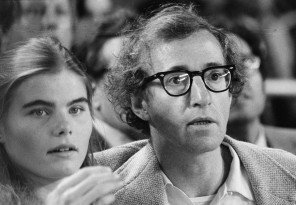What Critics Said About Woody and Mariel
 Was chatting with my wife today and we agreed that back in 1979 we shared the same opinion about Woody Allen's Manhattan, which we probably saw together in New York (yes we go back that far): Much of the film was very good but it was severely compromised by its depiction of Woody's character, age 42, having an affair with the Mariel Hemingway character, age 17, a senior in high school. We recalled that we were amazed how few critics at the time expressed any concern or complaint about that. Of course, the film critic crowd was then overwhelmingly male. Yes, Woody at the end of the film decides that, hey, maybe she is too young, but still...
Was chatting with my wife today and we agreed that back in 1979 we shared the same opinion about Woody Allen's Manhattan, which we probably saw together in New York (yes we go back that far): Much of the film was very good but it was severely compromised by its depiction of Woody's character, age 42, having an affair with the Mariel Hemingway character, age 17, a senior in high school. We recalled that we were amazed how few critics at the time expressed any concern or complaint about that. Of course, the film critic crowd was then overwhelmingly male. Yes, Woody at the end of the film decides that, hey, maybe she is too young, but still...Did we recall correctly that very few critics shared our view? I decided to find out what leading reviewers did say about the film. I knew it was a critical favorite. (Indeed, I was a Woody fan at the time, thanks to Annie Hall and Sleeper.) Andrew Sarris called it the only great American film of the entire decade. Time magazine put him on the cover, call him a "genius," and their piece (ouch) "Woody Allen Comes of Age." And so on.
Sadly, Google let me down, producing only a few reviews from that year. I'll keep searching. But for now, here are reviews from two leading male critics (which sustain our memory of how most critics responded) along with critiques from, ahem, two well-known women. I'm excerpting only comments about the aging man's affair with the Mariel Hemingway character. Note Canby's reference to Mariel as a "nymphet." More to come, I hope.
Vincent Canby, The New York Times, April 25, 1979:
"Manhattan" is, of course, about love, or, more accurately, about relationships. Among those who are attempting to relate to Isaac Davis are Mary Wilke (Diane Keaton), a journalist who carries on like an Annie Hall who has been analyzed out of her shyness into the shape of an aggressively neurotic woman doomed to make a mess of things, and Tracy (Mariel Hemingway), a beautiful. 17-year-old nymphet with a turned-down mouth and a trust in her 42-year-old lover, Isaac, that is also doomed...Roger Ebert, January 1, 1979:
The story follows several characters through several affairs. Woody himself is twice-divorced as the movie opens -- most recently from a lesbian who is writing a book that will tell all about their marriage. He is having an affair with a seventeen-year-old girl (Mariel Hemingway). His best friend, Yale (Michael Murphy), is married and is having an affair with a girl he met at a party (Diane Keaton)....Pauline Kael, The New Yorker
I'm most disturbed by the final scene between Woody and Mariel Hemingway. It's not really thought out; Allen hasn't found the line between the irony the scene needs and the sentiment he wants his character to feel...
And yet this is a very good movie. Woody Allen is ... Woody, sublimely. Diane Keaton gives us a fresh and nicely edged New York intellectual. And Mariel Hemingway deserves some kind of special award for what's in some ways the most difficult role in the film. It wouldn't do, you see, for the love scenes between Woody and Mariel to feel awkward or to hint at cradle-snatching or an unhealthy interest on Woody's part in innocent young girls. But they don't feel that way: Hemingway's character has a certain grave intelligence, a quietly fierce pride, that, strangely enough, suggest that even at seventeen she's the one Woody should be thinking of during Gershwin's "Someone to Watch Over Me."
What man is his forties except Woody Allen could pass off a predilection for teenagers as a quest for true values?"Joan Didion, August 16, 1979, The New York Review of Books
The characters in Manhattan and Annie Hall and Interiors are, with one exception, presented as adults, as sentient men and women in the most productive years of their lives, but their concerns and conversations are those of clever children, “class brains,” acting out a yearbook fantasy of adult life. (The one exception is “Tracy,” the Mariel Hemingway part in Manhattan, another kind of adolescent fantasy. Tracy actually is a high-school senior, at the Dalton School, and has perfect skin, perfect wisdom, perfect sex, and no visible family.)
Published on February 05, 2014 17:40
No comments have been added yet.



